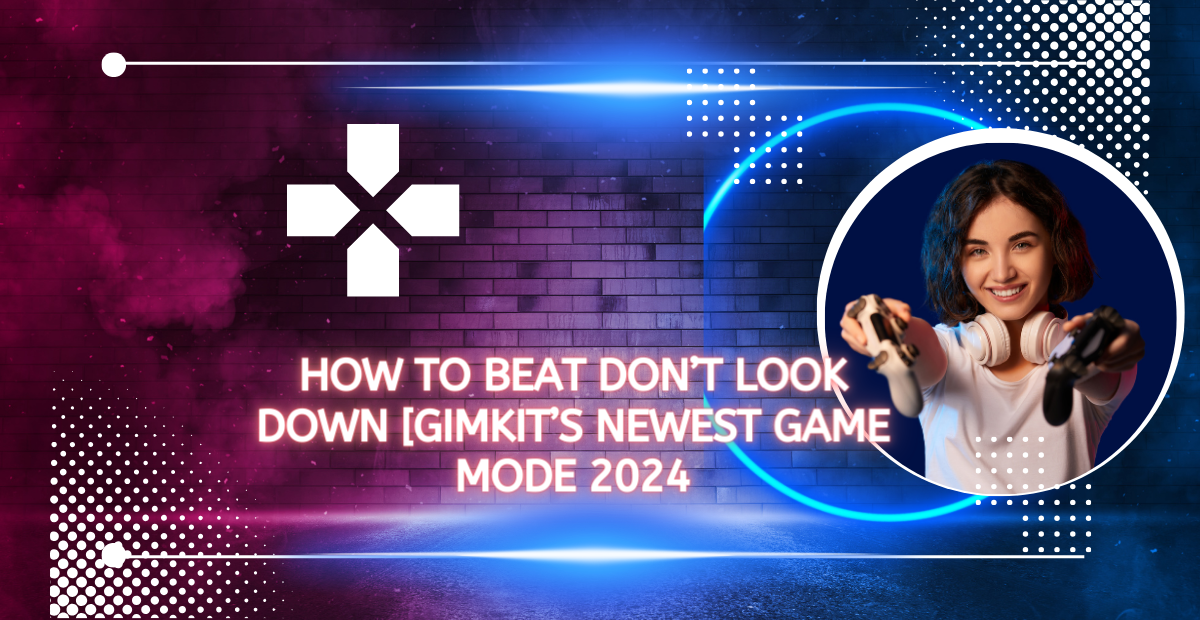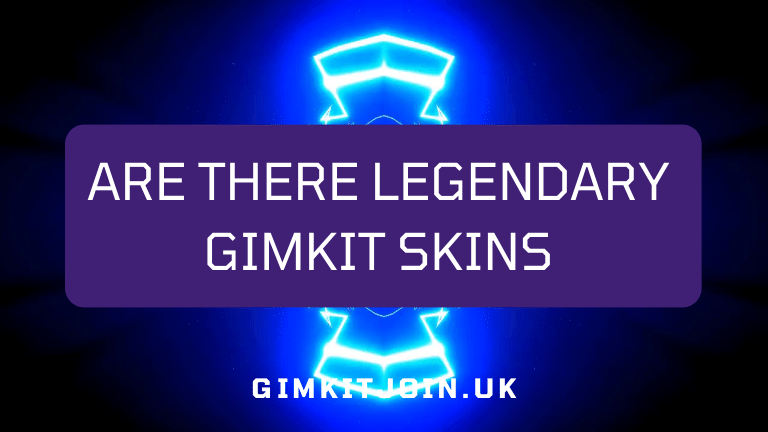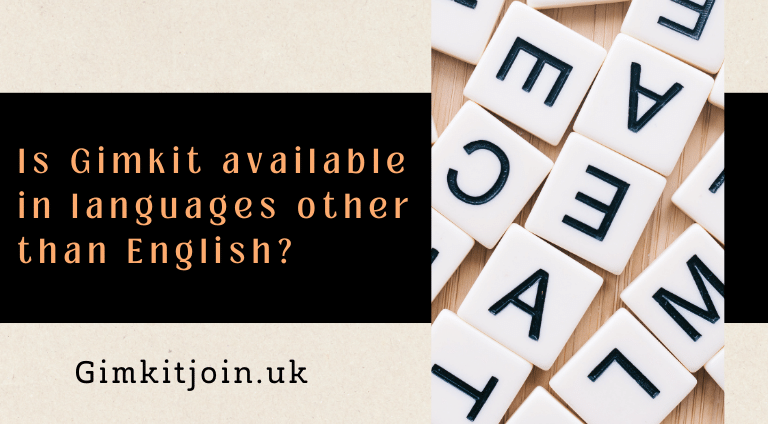How to Beat Don’t Look Down[Gimkit’s Newest Game Mode 2024]
How to Beat Don’t Look Down Gimkit’s Newest Game Mode 2024 Here we will break down top tips for mastering Don’t Look Down to ace every match
An Overview of How Don’t Look Down Works
The concept of Don’t Look Down is simple, yet highly competitive. All players race against the clock to correctly answer multiple choice questions as quickly as possible. The quicker you respond, the more points awarded per question.
However, there’s a catch – you cannot see the answers. Instead, options randomly cycle rapidly through A, B, C, or D on each player’s screen. You must choose based solely on the question asked and deductive reasoning.
Players utilize keyboard shortcuts to select answers, allowing for faster selections. Buzzing in incorrectly results in a small point deduction as penalty. At the end of the match, the player with the highest score wins.
With no visible answers to select, success requires paying close attention to questions, making logical guesses based on knowledge, and reacting instantaneously. Let’s break down key strategies to put these skills into practice.
Tips for Mastering the Don’t Look Down Format
1. Gauge the Difficulty of Each Question Quickly
As answers flip by disorientingly fast, there won’t be much time to contemplate each question in depth. Get a sense of difficulty level right away based on the subject matter and length to gauge how confident you feel.
For broader, more straightforward questions, you’ll likely want to take a chance and buzz in quickly before the timer expires. Save deeper analysis for more advanced problems where deductive reasoning can narrow options.
Categorize each one as either:
- Easy – Familiar topics and simple phrasing where gut reaction could suffice
- Moderate – May require brief logic and elimination
- Difficult – Complex issues that need thoughtful reflection
This split second assessment as questions populate will help prioritize response strategy.
2. Brush Up on Common Trivia Topics
Since you won’t have the luxury to slowly decode questions during play, having stronger base knowledge on widely tested categories will give you a leg up.
Reviewing factoids, definitions, and concepts around subjects like:
- History
- Science
- Geography
- Entertainment
- Sports
- Art
Can prep your brain for quicker recall. Even if not yet an expert in every possible realm, expanding general awareness of popular trivia through self-quizzing will help hone those rapid deductions.
3. Stay Laser Focused to Catch Every Word
With the area for answers flashing consistently, it takes extreme concentration to follow each question posed amidst the distraction. Any lapse in attention or glancing away could result in missing a key term that makes deducing the solution impossible.
Avoid multitasking while playing and keep senses trained only on the words popping up. Use techniques like:
- Sitting in an area without noise disruption
- Staring constantly at the center of the screen
- Reading sentences multiple times internally
This singular focus is tiring, but also where the “Don’t Look Down” name derives its meaning. Keep mental engagement peaked to grasp content accurately.
4. Apply Deductive Reasoning Strategies
Reading efficiency will allow you to categorize level of problem complexity quickly as mentioned previously. For more advanced questions, you’ll need to leverage more critical thinking in a narrow window.
As the answer cycle begins, mentally eliminate immediately implausible choices based on what you absorbed. Then try to make logical assumptions about the most probable solution based on formation of the question.
For example, LONGER inquiries usually imply:
- Chronological ordering – Which came first?
- Definitions – What best describes the meaning of a concept
- Comparisons of numerical values
While SHORTER versions often ask you to:
- Identify singular facts – Who? Where? Percentage of something?
- Fill in common phrasing patterns – Blank is to blank as blank is to _.
Of course without seeing the exact options, educated guessing is still required. But using these cues along with general knowledge can significantly boost accuracy.
5. Cultivate Decisiveness Under Pressure
A critical advantage in Don’t Look Down is making selections firmly the moment analysis concludes instead of wavering while possibilities shift. Confidently committing to the best theory crafted, right or wrong, averts wasting precious response time backtracking.
Hesitating over slight doubts or triple guessing will almost guarantee answers disappear before inputting. Have the courage of your convictions to match the question cadence through tools like:
- Trusting instincts faster rather than overscrutinizing
- Hitting buzzers assertively once a reasonable case is built
- Accepting some wrong choices will occur amid the pace
While decisiveness improves through gameplay experience itself, consciously reducing doubt can hasten progress.
Helpful Gameplay Strategies and Settings
Now that foundational techniques of observation, deduction, and conviction are reviewed, exploring gameplay itself can reinforce skills further. Certain settings, point goals, and competition formats enable you to fine tune speed and smarts simultaneously.
Use Solo Play to Increase Accuracy
When first adapting to Don’t Look Down’s unconventional format, measuring accuracy itself without rivals can be insightful. Playing solo games eliminates pressure so you can better self-evaluate areas for refinement against question timing and deduction methods.
The stats page outlining correct and incorrect percentages after each match also indicate knowledge gaps to shore up through more trivia studying. Mastering solo proficiency builds a critical baseline before adding in other opponents.
Compete Against One Opponent
Once comfortable with the individual question-answer rhythm required, limited head-to-head play allows focus on a sole competitor dynamic without becoming overwhelmed managing multiple players.
Subtly shift techniques like:
- Speeding up responses on simpler questions
- Aiming for early leads to force pressure on others
- Observing how other play styles influence your tempo and second guessing
You can evolve viable approaches for maintaining an edge as matches intensify in the home stretch, a likely time for concentration lapses.
Use Custom Lobbies to Control Settings
For those desiring more variability, creating custom Don’t Look Down sessions through Gimkit’s lobby options enables personalizing key elements like:
- Number of Participants – Scale up incrementally from two to eight players as skills progress
- Question Volume – Lower totals like 25 build endurance compared to 50+ requiring more consistent accuracy
- Timer Length – 15-30 seconds develops urgency while 5-10 seconds is expert pacing
- Buzz Penalty – Heavier deductions like 50% train decisiveness for unclear questions
Saving preferences under custom names allows repeating environments conducive to certain practice goals. And the ability to share special links gives access to tailored games with friends or classmates as well.
Prioritize Consistent High-Scoring Over First Place Finishes
While the thrill of finishing #1 cannot be denied, at early stages, focusing on point consistency game-to-game has more developmental value for strategy sticking.
Identify benchmark point totals that indicate excellence given question volume and timer speed. From there, aim to regularly hit or exceed that number before concerning yourself with the highest score.
This establishes a metric for success in understanding the game itself deeper rather than obsessing over leaderboard rank. Consistently notching benchmarks through smart risks and educated guesses better prepares you for the razor thin margins between victory and defeat anyway.
Expert Techniques to clinch Close Matches
Once comfortable playing Don’t Look Down through the progressions above, veterans can still fall just short of first at times when highly skilled opponents emerge. Survey techniques experts leverage specifically for winning ultra tight contests.
Double Check Answers If Far Ahead Late
While cultivated decisiveness pushes back on second guessing, verifying selections if you build a sizable lead with just a handful of questions remaining can be worthwhile.
Only utilize this late in games where missing a point or two won’t put victory in peril. The slight delay pays dividends limiting surprise wrong answers that could place finish order in jeopardy.
Be especially diligent on mathematical problems or ordered steps where details matter greatly. Even one small misread term flipped around can undo an otherwise strong effort.
Rush Initial Answer on Final Question
The last problem posed presents a golden opportunity to clinch an extremely close match with a split second decision.
In narrowly trails second scenarios, quickly buzzing on the first cycling choice before fully reading the full inquiry could give you slight jump edge. This risky blind guess conveys you don’t need points, just a correct answer, so that first blink reaction cal beat opponents to the punch.
Conclusion
Mastering Gimkit’s intense new Don’t Look Down format tests both trivia knowledge and reactive speed simultaneously. By adopting techniques to categorize question difficulty rapidly, leveraging deductive reasoning under pressure, and competing incrementally against rising talent, your accuracy and pace will heighten dramatically.
Trust your instincts, limit self-doubt, and stay locked in using focus tools as matches intensify. While a razor sharp mindset takes practice, continually hitting point benchmarks signals you’re progressing well on the path to quick-buzz dominance.
Soon you’ll be strategically clinching those down-to-the-wire victories thanks to expertise making split second choices based more on educated deduction rather than pure guesswork. Both solo study and competitive play each strengthen skill areas that combine for overall success.
Ready to exercise your brain’s speed and smarts? Then start training now to develop Into a consummate Don’t Look Down player equipped to triumph over any knowledge or experience level with the right approach.
FAQs
Does any particular type of player do better in Don’t Look Down games?
Those with wider general knowledge and trivia strengths enjoy starting edges. But equally savvy deduction and refusal to waver under time constraints can allow players of any original expertise to close gaps through strategic chops.
What question or gameplay settings should total beginners use?
When first attempting Don’t Look Down, limit opponents, utilize longer timers (30 seconds +) and smaller question batches around 25. This slower environment allows grasping core techniques before intensifying variables.
What is “Don’t Look Down” in Gimkit?
“Don’t Look Down” is the latest game mode introduced by Gimkit. It’s an exciting twist on the traditional format, where players must answer questions correctly to prevent their character from falling off a virtual platform. It adds an element of suspense and urgency to the gameplay, making it both challenging and thrilling.
How do I access “Don’t Look Down” on Gimkit?
To access “Don’t Look Down,” simply log in to your Gimkit account and navigate to the game modes section. From there, you’ll see the option to select “Don’t Look Down” alongside other available game modes. Click on it to start playing and enjoy the adrenaline rush it offers!
Can I play “Don’t Look Down” solo, or is it multiplayer only?
You have the option to play “Don’t Look Down” solo or with friends in multiplayer mode. Whether you prefer to challenge yourself individually or compete against others, the game mode offers flexibility to suit your preferences. Invite classmates, colleagues, or family members to join you for even more fun!



![How Many Hours is Shadow of the Erdtree? [2024]](https://gimkitjoin.uk/wp-content/uploads/2024/06/How-Many-Hours-is-Shadow-of-the-Erdtree.webp)
![The Story Behind Gimkit’s Iconic Logo [2024]](https://gimkitjoin.uk/wp-content/uploads/2024/02/Youre-an-online-learning-hero-3-768x480.png)


